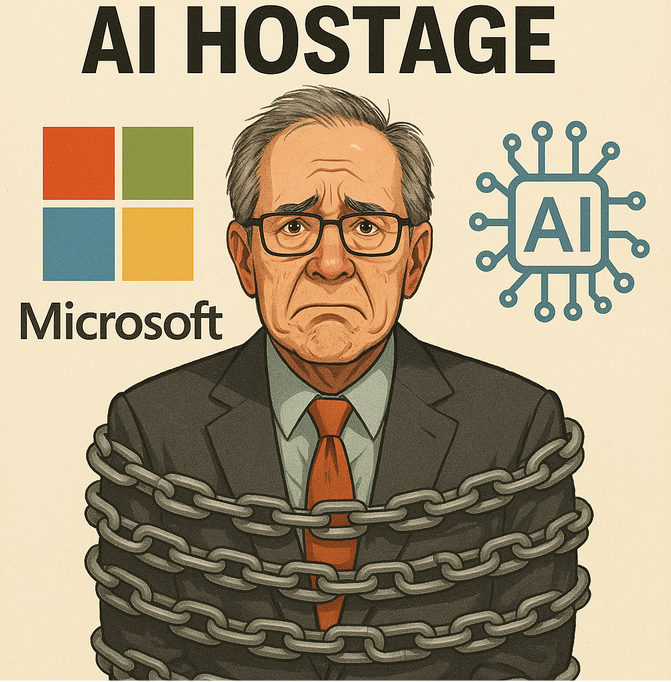MICROSOFT'S AI HOSTAGE
(CRWV), (MSFT)
My old college roommate owes me. Big time.
"It'll be fun," he promised, arm around my shoulder at our reunion. "Just judge one high school investment competition. They're brilliant kids!"
Twenty years of friendship, and this is how he repays me for helping him land his first bulge-bracket banking gig? Sitting through PowerPoint presentations from teenagers explaining cryptocurrency to me like I'm their technologically-challenged grandfather?
I'm adding this to my mental ledger, right next to the time he convinced me to go mountain climbing in Nagano during a blizzard while we were both covering the Japanese financial markets in the '80s. I still have the frostbite scars to match the losses in my first Nikkei futures account.
The grand finale was a particularly confident team pitching CoreWeave (CRWV) with the kind of unbridled enthusiasm usually reserved for Marvel movie premieres and PlayStation launches.
"It's the backbone of the AI revolution!" declared their 16-year-old team leader. When I gently asked about profitability timelines, they looked at me like I'd suggested valuing companies by counting their office furniture.
"That's old-economy thinking, sir," the young man informed me, actually patting my shoulder sympathetically.
I'm plotting my revenge – maybe I'll volunteer my friend to chaperone his daughter's senior prom – but I couldn't help laughing because these kids perfectly captured today's market psychology: growth at all costs, profitability as an optional future feature.
CoreWeave has certainly turned heads with its 9.75% jump to $61.36 since publication - outperforming the S&P's modest 1.62% gain.
The market loves a good AI story, and CoreWeave is spinning a compelling narrative as the specialized cloud infrastructure company powering the next generation of artificial intelligence.
But as my father used to say while reviewing balance sheets, "Revenue is vanity, profit is sanity, and cash is reality."
And CoreWeave's reality? It's burning through $5 billion in cash annually with the enthusiasm of a lottery winner on their first Vegas trip.
To put that burn rate in perspective, that's like buying a new private jet every week and using it exclusively for paper airplane competitions.
The company's $5.2 billion in net debt (even after its $1.5 billion IPO raise) isn't just concerning – it's downright alarming. In my experience, tech companies carrying debt exceeding 20% of their market cap tend to underperform the market by about 30% over the following three years.
Even more concerning than the debt is CoreWeave's customer concentration. With 60% of business coming from Microsoft (MSFT), they're not in a partnership – they're in a hostage situation.
During my hedge fund days, I witnessed a promising analytics startup derive 40% of revenue from a single client. "We're diversifying rapidly," the CEO assured investors before their anchor client cut spending by half, and the company's valuation followed suit.
Microsoft isn't known for charity work – they're calculating, strategic, and hold all the leverage in this relationship. If Microsoft catches a cold, CoreWeave catches pneumonia and has to be rushed to financial intensive care.
The growth numbers are admittedly eye-popping – 1,346% revenue growth in FY2023 followed by 737% in FY2024. These are the kind of statistics that make investors jump in without reading the fine print.
And CoreWeave's biggest red flag? $2.5 billion of debt coming due in the next 12 months while the company only has $2.8 billion cash on hand.
That's cutting it closer than the time I had to navigate through the Kyber Pass in a questionable Land Rover with a failing transmission and half a tank of gas. Both scenarios keep you wide awake at night wondering if you'll make it to your destination.
Could CoreWeave defy financial gravity? It's possible. Markets aren't always rational, especially when AI is involved.
The stock could double to $100 per share in the coming weeks purely on speculative fever. I've watched stocks with worse fundamentals moonshot on nothing more than wishful thinking and buzzwords.
Another upside scenario: what if another major tech player becomes a significant customer? That would diversify away from the Microsoft dependency and potentially create a competitive bidding situation.
But betting on a white knight scenario is like buying real estate in a flood zone because someone might build a dam upstream – technically possible, but not the way smart money plays the game.
I'm an inflection investor – I look for companies at the point where their prospects improve, not where hopes and dreams collide with financial reality. When the fundamentals are this challenging, I prefer to watch from the bleachers with my popcorn rather than take the field.
This might turn into the next meme-stock frenzy – and if it does, I'll tip my hat to the traders who time it right – but sustainable businesses build wealth, not speculation.
I'll be watching CoreWeave's next earnings report with interest, but my investment dollars are staying far away from this particular AI rollercoaster. Some thrill rides just aren't worth the ticket price, no matter how exciting the promotional materials make them look.
And as for those bright-eyed high school students who pitched CoreWeave with such conviction? I'm sending them each a copy of "Security Analysis" by Graham and Dodd with the profitability chapters highlighted in neon yellow.
My college roommate can handle the shipping costs. After all, he still owes me.

